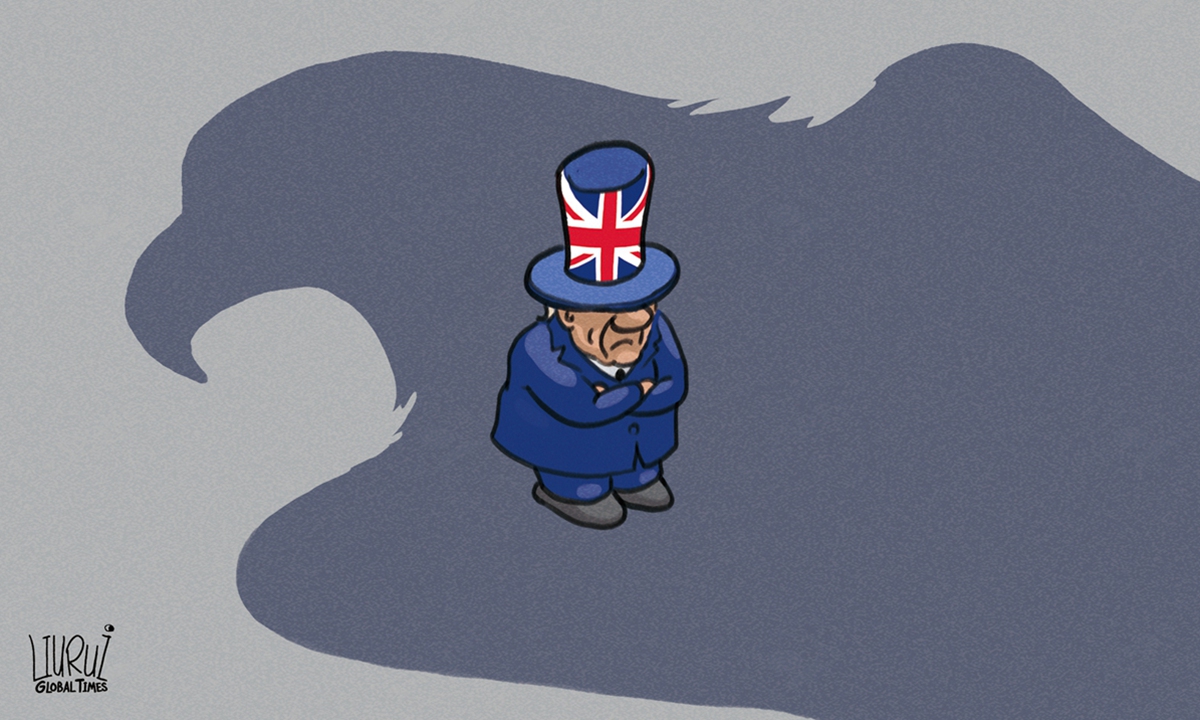
UK US relations Illustration: Liu Rui/GT
It is no coincidence that on Monday, the Commonwealth Day, the UK released its refresh of the integrated review of defense and foreign policy. In conjunction with that, British Prime Minister Rishi Sunak visited the US where he held a trilateral summit with his counterparts Joe Biden and Australia's Anthony Albanese, where they fleshed out details on the AUKUS alliance. Sunak, described China as an "epoch defining challenge" to the international order, setting the framework for the growing militarization of British foreign policy following America's crusade into the Indo-Pacific. On that same day, the UK also announced it would increase submarine-related exports to the island of Taiwan.
Despite this, Sunak has also claimed that "when it comes to global affairs, you can't ignore China," citing "climate change, global health, macroeconomic stability." Although Sunak's use of language is softer than his predecessor Liz Truss's, it is nonetheless clear that he has pivoted British foreign policy toward confrontation with China at the behest of the US, and until Britain establishes feasible independence and autonomy in its foreign policy, talk of so-called "cooperation" with China cannot be taken seriously because it is not truly London who is calling the shots. While the situation at home is deteriorating, the UK is following Washington into a destructive global crusade.
Britain's contemporary foreign policy is built upon ideology and nationalism, as opposed to serious "national interest." The victory of leave in the 2016 European Union Referendum produced a systemic shift in Britain's foreign policy which saw it disregard liberal internationalism and economic benefits, in exchange for advocating a nostalgia of empire and ideological exceptionalism. The root cause of Brexit was social divisions in the UK exacerbated by economic policies which do not deliver for ordinary people, besides the failure of the UK to come to terms with its "post-imperial identity" and the UK's subsequentially rejecting affiliation with Europe, which led to a contentious relationship with the EU even when it had no desire to leave.
Now, the UK's view of the world is tinted with Anglophone exceptionalism, the belief that Britain still is a resurgent great power which can use the power of its navy to impose its will on other countries and discipline so-called "rule breakers" such as China, of course reflecting the horrific atrocities and crimes it inflicted on the country during the 19th century. In deciding to sign up to Washington's anti-China pursuit, the UK has effectively abandoned a relationship with Beijing as a beneficial economic partner, with Sunak proclaiming an end to the "golden age of relations" with China last year. Now, the UK de-facto views Beijing as a hostile state to be contained and follows the US's preferences, not its own.
In doing so, there is no good reason to believe the UK is capable of independently cooperating with China beyond anything the US will permit, even when it comes at its own expense. When the UK wanted to build a 5G network using Huawei, the US coerced and bullied it into changing course, resulting in renewed costs exceeding billions. When the UK wanted to allow a Chinese takeover of a failing chip firm making non-strategic 200nm chips, the US demanded it veto it, even though it puts the jobs of 600 people in Newport, Wales, at risk. Every course of action the UK has taken, or intends to take, first emerges in the US, often contravenes British interests, and is never allowed if it contravenes the will of Washington.
The anti-China push by the UK comes amid deteriorating economic conditions at home. British GDP is stagnating, has never truly recovered from the COVID-19 pandemic, incomes are shrinking, inflation is surging, international companies no longer believe Britain to be a profitable investment, and public services are poor. Yet for all this, the UK is spending more and more money on defence spending for a region they are not a part of, and have nothing to show for their own people. It goes without saying that Sunak's government faces record unpopularity with some opinion polls placing the Labour Party up to 50 percent. In a nutshell, Britain is a country in decline, yet now advocates the line that a rising China must be stopped. No, British politicians must stand up to their puppet masters in Washington and stop becoming a force for war and chaos around the world in defence of the legacy of Empire. Britain can only recuperate itself as a modern, peaceful, dynamic and pragmatic country which recognizes the past is in the past. Contemporary China is not the Qing Dynasty, and the legacies and humiliations of old will never be repeated. The UK still thinks it is a global empire, but its emperor has no clothes. There is no prosperity, good fortune or progress that will await the UK on its current trajectory.
The author is a political and historical relations analyst. opinion@globaltimes.com.cn




